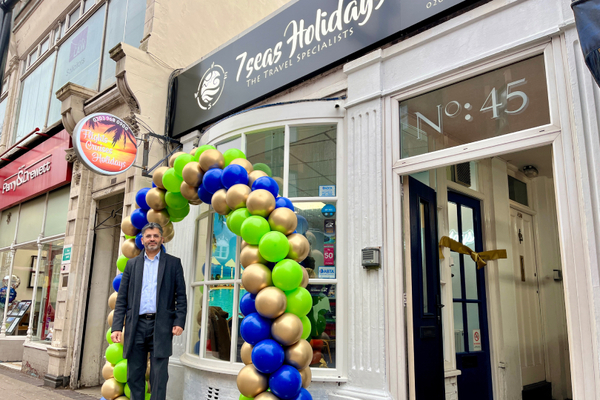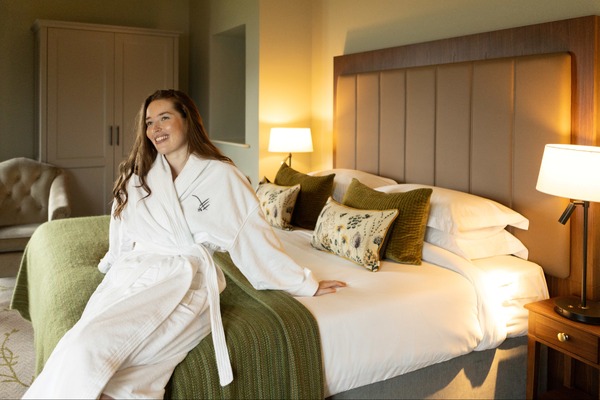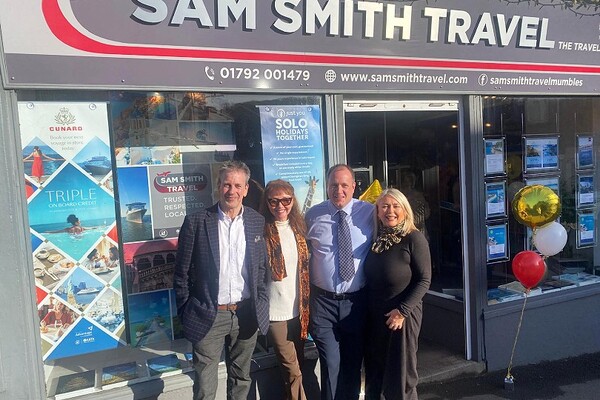What does the future hold for luxury travel advisors? A lot, say experts
Things remain tough, but luxury travel advisors may be able to shine even brighter soon, thanks to appreciation of high service levels by affluent clients who have accrued even more disposable income during the pandemic and cannot wait to travel.

Clinging onto a rollercoaster speeding through a dark tunnel probably comes close to describing what life has been like for any luxury travel advisor since last March.
Those who have made it this far deserve huge kudos for their resilience, and while they know the journey is far from over, can at least be reassured that affluent consumers are still out there, many of them having accrued even more financial might during the pandemic.
“We are remaining hopeful of the return to travel, as the key thing is how the affluent are as rich, or richer, than ever coming out of the pandemic,” says David Kolner, senior vice president for network products and strategy for global luxury network Virtuoso. “We don’t have the challenges of the global financial crisis in 2008/9 – when clients lost value in their portfolios or net worth and were more hesitant to spend or travel – I think this recovery, at least for now, looks like it could be very healthy and quick as everyone has pent-up demand and are ready to spend at almost any costs.”
“It’s time to open that opportunity up by offering upgraded experiences. It’s the time to sell that suite, that bungalow, that veranda, that villa.”
The optimism seems strongest among the organisation’s EMEA members too. When asked how they were feeling about their business right now, 47% of Virtuoso’s EMEA agency members said they’re optimistic; higher than any other region where it operates. The only group more hopeful were US Virtuoso members, bolstered by the return of domestic travel there.
Kolner says Virtuoso is encouraging all member agencies to charge fees or, if they already charge, to update their fee schedules and price their time and expertise accordingly.
“We’re all experiencing this differently – in the travel industry we’ve had incredible challenges, personally, financially, in our business, in our network of colleagues, but the HNW consumers are still wealthy,” he stresses. “It’s important for advisors not to confuse their personal financial experience of the pandemic with their clients, who are wealthier than ever by most statistics.”
To fee, or not to fee
But one of Virtuoso’s UK members, Andrew Devine, director of Beaver Travel, doesn’t envisage a fee model taking hold in his business, and doesn’t really envisage much change to his Radlett shop either.
“I think we’ve heard it all before; history tells us when all this madness is over, the high street will once again be a place for community business,” he says, adding some other positive changes are coming around. “We’ve become a paperless office which is a good thing, and we focus more on social media now. We have also been looking at the home working model. Key overall will be marketing our knowledge about navigating to holiday destinations with flexibility. More people will contact luxury agents for the comfort and peace of mind, and as the market gains momentum we will be looking to expand.”
For fellow independent agent Oliver Broad, joint managing director of RB Collection, the pandemic is a chance for change.
“The world has changed and so must we. I believe we need to stop expecting a ‘bounce back’ or ‘return to normal’; it’ll never be the same,” he says. “That doesn’t mean it will be worse necessarily, we just have to be able to adapt, which is what we’re good at, especially when you are small and independent.” He adds that 2022 will be a chance to “explore new markets we may have been nervous about before”.
2022 will be a chance to “explore new markets we may have been nervous about before”
“Every sector has changed; it’s going to be an entrepreneurial revolution,” he muses. “New airlines, new hoteliers, new DMCs, new tour operators and new agents – I see it as a very exciting time as well as challenging. Growth will depend on where the demand is of course, but it’s about being adaptable, reliable and visible.”
“Going on holiday is far more complicated than ever before and we’ve already heard comments from clients telling us they want a specialist to look after them in the current climate. We’ve had referred friends and family too because of this very reason. We can really enhance the trip with finer details and clients are understandably nervous so we can bring health and safety and hygiene into the mix too.”
So does Broad feel all this might mean the time has come to implement a consultancy fee?
“I’ve always been a fan of this and always implemented it when appropriate. I’m confident I add more value than if someone is booking a complicated bucket list trip themselves, and so for that I want a sign of commitment from the client they respect that from the start,” he says. “There’s nothing worse than putting your heart and soul into something, only to be taken advantage of and lose a booking. It isn’t always relevant, but post-pandemic, I feel clients are prepared to pay a little more or an up front deposit to an expert which will come off the cost later.”
“I think good travel agents have proven their worth more than ever before over the last 14 months. We have always remained positive and open for business and this has meant we have had more clients travel than the average agent,” considers Amanda Matthews, managing director of Designer Travel. “We will continue with this positive stance, sending clients away fully informed of the risks and hoops that need to be followed or understood.”

The happiness factor
Somewhere fees have never been an issue is in the concierge model, with some in this sector having done particularly well during the pandemic, moving now into renewed growth mode, such as Ten Group, which provides the travel and concierge services for the upper echelon customers of top banks such as Coutts, NatWest Private Banking and HSBC Jade.
“Our revenues fell during Covid, but only by 28% and we managed to stay profitable, didn’t take in any debt or sell any shares,” says Ten founder and chief executive Alex Cheatle. “For some agencies, service is a means to an end, but for us, it is the end – we don’t get paid commission on what we sell, our members pay the fee no matter what the service. Clients may not have been travelling, but we have still helped them in a number of other ways.”
This has included the likes of arranging virtual events with favourite performing artists, getting clients into the best restaurants in London when they reopened, helping them develop their garden spaces, running book clubs with key authors and ultimate staycations. “We’re paid just to make them happy,” says Cheatle.
“And we’re now expanding in lots of areas recruitment-wise, such as dining, travel, music and entertainment to make sure we can continue to do that. Even members who might have booked some of their travel online in the past outside of what we offer have come back as they’ve had their fingers burned trying to get refunds or rearrange things,” he says.
Richard Dixon, director of Holidaysplease, also agrees it’s a time for positivity; generally: “The luxury travel sector is best positioned to see a really strong recovery over the next two to three years. There will continue to be bumps along the way, but those companies that have added true value to their customers through these turbulent times will be the ones valued most going forward and therefore best placed to take advantage of the exciting recover ahead. Whatever the times, there will always be evolution.”
“The luxury travel sector is best positioned to see a really strong recovery over the next two to three years”
Dixon adds he thinks one of these evolutions could be in the area of service fees – but not for all. “While I’m a strong believer in the power of building a sustainable and profitable business via customers that put value and service ahead of price, I’m not sure that a service fee model would be good for travel agents as a whole,” he says. “I think a few very high-end agents could make it work, but for most it would be a challenge. I do suspect though there may be some changes to the way tour operators and travel agents manage customer funds generally though as a result of the CAA’s review of the Atol system.”
“What we may see over the next five-10 years is a kind of merging of the operator and agent model into one, to a greater or lesser degree,” he suggests. “In the independent sector in particular I can see like-minded agents and operators forming strategic commercial partnerships based around a shared profit opportunity rather than the straightforward commission model of old.”
High time for the high street
RB Collection’s store is in Lichfield, but Broad says it’s too soon to say if they will make changes there.
“This all depends on demand. People love dealing with people and there’s nothing better than a face-to-face chat; I envisage luxury travel lounges or members’ club style locations becoming more popular. We don’t have brochures out anyway, so we already provide this kind of environment,” he says. “It’s going to be a very entrepreneurial environment so it’ll be important to monitor what’s happening on the high street carefully.”
“No doubt we’ll see fellow retailers offering more social spaces; we have a new coffee shop already next door and a gym on its way. It’s time for agents to re-engage with local traders, it’s a clean slate and in some ways, you have to ignore what we’ve learnt in the last 35 years about shopping habits and start again. Some may see this daunting others may see it a fresh and exciting start.”
“I do have concerns around the long-term health of the high street in big cities and around retailers that are national brands,” adds Dixon. “At a more local, market town level, however I think there are going to be real opportunities for independent businesses to thrive. Local businesses that are community-driven and imaginative about their positioning in their community I think have a really healthy future in front of them.”
Matthews reflects this view also: “I think major towns and cities may struggle as large shops close and open up online or in out of town centres. I think community travel agents will continue to have a place and be part of the community though.”
Of course Designer and Holidaysplease’s models rely on supporting a network of homeworkers, who were already well set up before this mess started. But Dixon says they will still invest further in online functionality, something the company has been adding to its website over the last year.
Home from home
“The crisis magnified the areas we are traditionally strong and also shone a light on areas we can be more efficient and improve in, and those things combined have already led us to implement some fundamental changes in the way the business is managed, and set in motion tasks that will keep us lean and mean as we grow out of the crisis,” he says, also highlighting the recent appointment of Cat Reeves as brand and business growth executive.
“Despite the turmoil of the last 12 months, many of our team have made some great strides with their businesses and at the same time we have welcomed new people onto the team who have done amazingly well,” says Dixon. “We have also seen a rise in our customer referral rate and have been winning more business than ever due to our service and reputation, even when customers may have been quoted a cheaper price elsewhere. We will be working hard to add further numbers to the Holidaysplease Homeworking team and investing further in the expansion of our Holiday Franchise Company opportunity, which has taken a huge leap forward through 2021.”
Recruitment of homeworkers is certainly getting more competitive, Dixon says, as new and existing travel companies look to develop homeworking teams, with more employed homeworking opportunities too, which may prove more attractive to those not so comfortable with a self-employed, commission-only model.
“There are definitely plenty of fantastic travel experts out there who continue to recognise the huge earning and lifestyle opportunity that only the self-employed uncapped commission-only models provide, and are ready to partner up with one of the established and excellent homeworking companies such as ours,” he says.
Designer Travel had 20 new homeworkers join in the last 12 months, but remains selective about who joins the network.
“Our model has managed better than others through this pandemic. For us it has always been about quality people who go the extra mile for their clients and that is exactly what we have all done every day since the start of this crisis,” says Matthews.
“If anything it has made us even more selective on new starters, taking those who want to promote the luxury sector and have the skills and attitude to be brilliant travel experts. We still see lots of opportunities to grow in the luxury homeworking space and we get excited on a daily basis talking to fantastic people who are thinking of taking the jump to homeworking,” she adds. “We will also be expanding our technology and third party contracts too, with the objective to generate central luxury leads for our central and homeworking teams.”
















